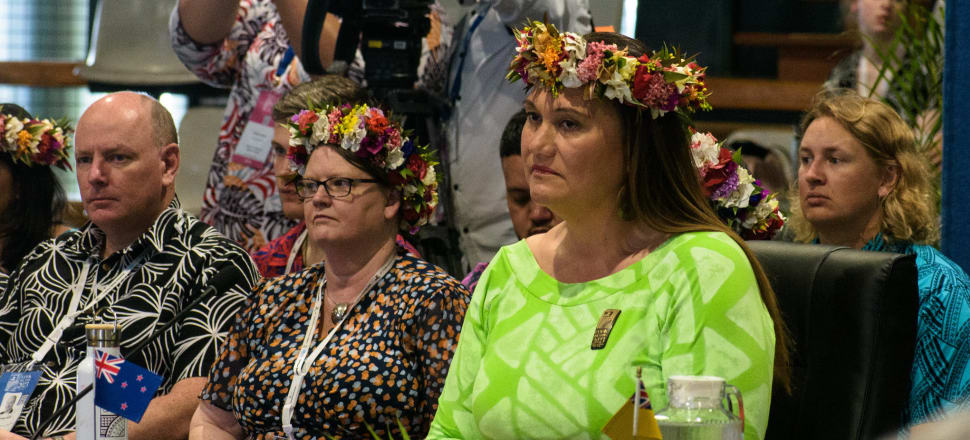
A walkout by one nation marred an otherwise undramatic summit, but the barriers to reconciliation between Nauru and the Pacific Islands Forum are not insurmountable, Marc Daalder reports
Despite the President of Nauru walking out of a meeting and flying home, Deputy Prime Minister Carmel Sepuloni says the 52nd Pacific Islands Forum summit was a success.
The Nauru walkout marred what was an otherwise uneventful forum, the first to allow non-Pacific dialogue partners to attend since the Covid-19 pandemic and the first since Kiribati threatened to leave the bloc in 2021.
In the end, it appears to have been a misunderstanding. Micronesia's pick for the next secretary general of the Pacific Islands Forum is the controversial former Nauru President Baron Waqa. Waqa expelled the top judge from the country while in power and is currently facing legal allegations of bribery.
READ MORE: * Vanuatu urges National not to restart offshore oil and gas * Nauru drops out of Pacific leaders retreat
Other countries were forced to stomach the pick, because Micronesian nations nearly quit the alliance two years ago when they said their turn to select the secretary general had been skipped over.
While Waqa has the reluctant support of the whole forum, some members were keen to discuss the process for picking future secretary generals.
In a plenary meeting on Thursday, Samoa's Prime Minister Fiame Naomi Mata'afa had raised concerns over the process by which Waqa was picked and asked for it to be discussed at the overnight leaders retreat on Aitutaki, 1News reported.
Adeang reportedly took this to mean Waqa's selection would be reopened and stormed out.
While Waqa later told 1News it was all a "misunderstanding", he and Adeang still skipped the subsequent leaders' retreat to the island of Aitutaki and left on a private charter plane on Friday morning, two days ahead of schedule. Adeang said as they departed that Nauru would be back for the next forum, so they aren't threatening to quit for good.
Nonetheless, the whole situation cast a bit of a cloud over the rest of the summit, which saw leaders create a new Pacific Energy Commissioner and Australia's inking of a treaty with Tuvalu to allow Tuvaluans to immigrate as climate change worsens.
The energy commissioner role is one of the asks of the Port Vila Call for a Fossil Fuel Free Pacific, which is being pushed by six low-lying island nations including Tuvalu. Some of the more ambitious asks, like ending fossil fuel extraction, were endorsed by the forum as good aspirations, but not the subject of immediate attention.
"That's not us stepping away, it's about aspiring to that fossil-free Pacific but acknowledging that that's going to be very, very difficult in the short to medium, or even the longer term," Sepuloni told Newsroom after the retreat.
That the call is being taken seriously will be a win for climate campaigners in the region, but the lack of adoption means some nations will engage in more pressure.
As Newsroom reported on Thursday, that pressure campaign has already begun to take aim at the incoming, National-led government. Vanuatu's outspoken Climate Change Minister Ralph Regenvanu, who has criticised Australia's fossil fuel industry in the past, called on National not to reverse the current ban on offshore oil and gas exploration in New Zealand.
"We call on them not to do it. To be in line with Paris, the 1.5 degree target, the science says you cannot do new fossil fuels," he said.
Gerry Brownlee, National's foreign affairs spokesperson who attended the summit as the representative of the incoming government, told Newsroom he saw gas as a transition fuel but the party's commitment to Paris and current climate targets remained unchanged. As evidence, he touted National's policy to make it easier to consent new renewable generation and Fonterra's just-announced climate targets.
"There's no question that New Zealand is still very, very focused on meeting its obligations, despite the view that might be held about one aspect of our policy."
These questions will continue to dog the new government, especially at the COP28 climate summit in Dubai in just a few weeks' time.
Overall, however, the Pacific nations did manage to present a united front, Nauru's misunderstanding notwithstanding. That was important at the first summit in several years where the 21 non-Pacific dialogue partners were able to attend and at a time of heightened geopolitical attention on the Pacific.
The United States made its presence felt at the forum by sending a delegation headed by the US Ambassador to the United Nations, Linda Thomas-Greenfield.
The fact that Thomas-Greenfield still came despite the ongoing deliberations at the United Nations about the Israel-Hamas war was intended to show the strength of the US commitment to the Pacific. Not only is she the face of the US at the United Nations, but she's also a member of Biden's Cabinet.
A united front from forum members was therefore crucial and it was largely achieved. Ahead of the forum, it was unclear whether the Suva Agreement which had patched the Micronesian rift in February would hold.
By continuing to back Waqa, members showed they valued unity, even if it meant an unsavoury figure as secretary general of the forum. The incident with Nauru shows there are still raw feelings between countries, but that Adeang has promised to return shows those barriers are not insurmountable.
"I think these things happen sometimes," Sepuloni said after the retreat. "You can't allow them to be a roadblock or to determine the way forward. There was certainly unity at the table.
"We would have preferred that that misunderstanding didn't occur, but it was still a successful day. The relationships between us, the conversations that occurred – be that formally or informally outside of the formal meeting – were really good conversations. They serve to strengthen the relationship but they also do demonstrate the unity that exists within the Pacific."







